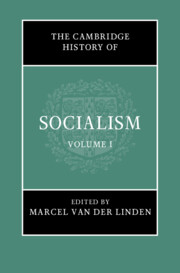Book contents
- The Cambridge History of Socialism
- The Cambridge History of Socialism
- The Cambridge History of Socialism
- Copyright page
- Contents
- Figures
- Maps
- Tables
- Contributors to Volume I
- Abbreviations
- Introduction to Volume I
- Part I Beginnings
- Part II Negating State Power
- The North Atlantic Region
- Africa, Asia, Latin America
- 20 Mexican Socialism
- 21 Anarchism and Syndicalism in Argentina
- 22 Anarchism and Syndicalism in Brazil
- 23 Anarchism and Syndicalism in Southern Africa
- 24 Anarchism and Syndicalism in China
- Worldwide Connections
- Index
- References
22 - Anarchism and Syndicalism in Brazil
from Africa, Asia, Latin America
Published online by Cambridge University Press: 03 November 2022
- The Cambridge History of Socialism
- The Cambridge History of Socialism
- The Cambridge History of Socialism
- Copyright page
- Contents
- Figures
- Maps
- Tables
- Contributors to Volume I
- Abbreviations
- Introduction to Volume I
- Part I Beginnings
- Part II Negating State Power
- The North Atlantic Region
- Africa, Asia, Latin America
- 20 Mexican Socialism
- 21 Anarchism and Syndicalism in Argentina
- 22 Anarchism and Syndicalism in Brazil
- 23 Anarchism and Syndicalism in Southern Africa
- 24 Anarchism and Syndicalism in China
- Worldwide Connections
- Index
- References
Summary
Establishing precisely when socialism and anarchist socialism arrived in Brazil is far from an easy task. Throughout the nineteenth century, references to European socialist thinkers or social reformers were common in the Brazilian press. At least since the late 1840s, authors such as Claude-Henri de Saint-Simon, Charles Fourier, Pierre Leroux, Louis Blanc, and Pierre-Joseph Proudhon were frequently mentioned. Nevertheless, these references were often critical. In a way, anti-socialism preceded socialism as a structured social movement. This can be measured by the fearful reactions to the Paris Commune of 1871 and by favourable remarks on Otto von Bismarck’s anti-socialist laws.
- Type
- Chapter
- Information
- The Cambridge History of Socialism , pp. 534 - 552Publisher: Cambridge University PressPrint publication year: 2022

